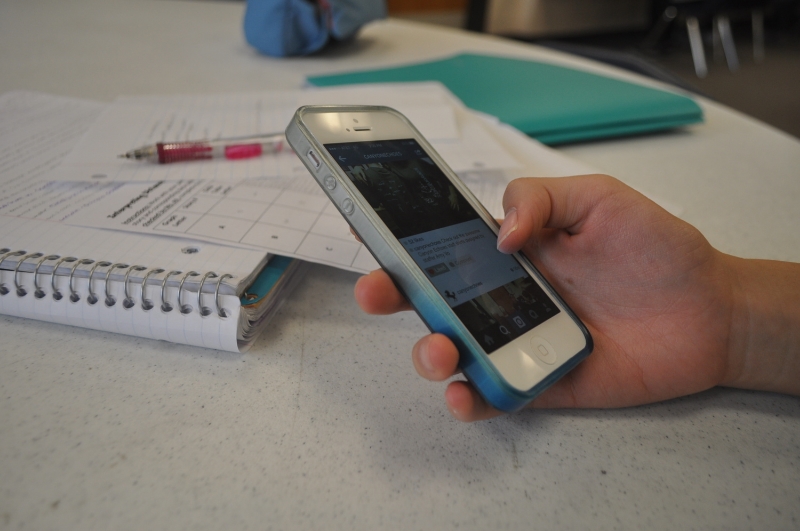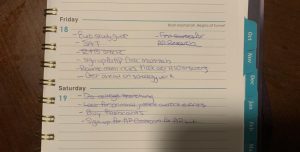How to Survive High School (Part 2)
Tips on Time Management,
Photo by Yetunde Olagbegi
We’ve got a brand new batch of study tips to survive hybrid learning at the high school.
School has just begun, and with that comes an overload of assignments that need to be done, projects that need completing, and so on and so forth. All of that work can be grueling, and sometimes it may feel like it is too much or there is not enough time in the day to get it done. Everybody is different, and has strategies that help them, while others have an entire, intricate way of completing their assignments.
Some things may work for you, and others may not. That is okay as long as you find a balance that helps you be the most productive and achieve the goals that you have set for yourself. I contacted my friends, most of them being seniors, and asked them what has helped them survive high school work thus far. I also asked family and friends I have outside of Pat-Med to see what helps them.
My friends and I have similar tools that work for us, and I also included tips that work for me that they didn’t say. Without further ado, here are a list of tips that will (hopefully) help you get the most work done in the smallest amount of time, and help you thrive in high school:
Keep yourself organized:
This applies not only to where you work but how you work. When you are doing homework, your desk or working area should be neat and tidy. You should know where everything is and how to get to it, to save you time and energy. Your notes should not be all over the place but set up in a way that is easy to understand so you can study them better. Sometimes separating all your work by subject helps. For example, if you use a binder invest in some dividers to separate the subjects from one another. Also, I have seen some pretty messy backpacks in my lifetime. If this applies to you, do not stress about it, but trying to tidy it up could help you to do work so much more efficiently and not waste time digging through the endless pit that is your backpack. Make sure to clear out your backpack and binder regularly, of course keep the important stuff as well. Keeping yourself organized will prevent you from stressing out over finding something and will just make your life much easier.
Do not work on something you are not motivated to do:
This will only reflect poorly on your work and will just make you miserable. Of course, nobody actually wants to do work, unless you do which is also cool, my point is there’s a difference between not wanting to do something and loathing it. If you find yourself muttering to yourself while doing your geometry work “this is so stupid I’m never going to use this” you may find that it will take you longer and you will not put any effort in to it. Listening to some motivational music or reading some motivational quotes before attempting your work is a good way to boost your mood so you can achieve your highest potential.
“I always feel inspired and motivated when I finish a good book, it makes me want to be productive. One of my favorite motivational quotes is ‘The trick is to recognize your mistakes, take what you need from them, and move on.’” ~Dalia Hagoug, my best friend extraordinaire
Make your notes colorful:
All of your notes do not have to be in boring blue and black pen—invest in some colorful ones instead! When notes are all in one color it is hard to separate one concept from the next. Color-coding your notes can be used as an organizational tool to help you structure your notes in a way that is easily understandable. This also gives your notes more flair and may encourage you to read them since they look so entertaining and more interesting to peruse.
“Colorful notes make notes look more desirable to work with! Nobody wants to work with just black ink (unless if that’s their thing). It just keeps things looking more organized and fun.” ~Natalia Lopez, 12th grade
During breaks do not stay idle, do something productive instead:
As mentioned in the last part, taking breaks in between studying and doing work is the best way to retain the information. While taking ten minutes to watch a marathon on TV is fine, it essentially disrupts your focus. Instead, take that time to eat, finish a personal project of yours, essentially, just do something productive. This will allow your mind to still remain in that “study mode” so that when you return to your work, you don’t find it difficult to concentrate and are able to pick up right where you left off.
For some, jam-packing their schedule works:
As mentioned in the previous part procrastination is the enemy to all work-related activities. We all have a tendency to put things off, especially if we only have a few tasks to complete. If you fill your schedule with things to do, even if it’s not school related, this can help you focus more and give you a rhythm to follow that may help you complete tasks. Things such as “clean room at 2, then math packet at 3,” can help “jam-pack” your schedule so there is so room for dallying and you can remain focused on your tasks.
Spread your work out, do not tackle everything in one day:
Do not tackle an assignment in one go, especially a lengthy one. First off, doing an assignment with a “fresh” mind boosts your interest in the assignment and gives you the motivation to complete it to the best of your ability. Spacing them out also helps with remembering the material. If you have a test on Friday and you do all the homework on Monday, not only did you probably not do it to the best of your ability, you won’t remember the material as well since you did it so long ago. The same goes for lengthier assignments. Breaking the assignments up day by day makes it more manageable to finish, much less daunting, and will certainly give you the time to put your all in to the assignment.
“By spacing out my work through a certain amount of days I’m able to understand the material much easier than if I were to cram it all in one day. By spending one day for a certain part of a unit/chapter I’m able to absorb that information clearly without having to worry about a deadline coming tomorrow. If I do this for a span of a couple days before that deadline i will feel confident about any upcoming event that will use that information. It may be hard to do this for me sometimes cause I can be easily distracted. So I would definitely recommend this for my more challenging subjects like history. But definitely don’t cram everything in one day, it didn’t help me.” ~Angel Herrera, 12th grade
“When dealing with a lengthy or intimidating project what works best for me is to break it up into smaller pieces. Tackling projects bit by bit as opposed to trying to finish everything all at once always results in a less stressful journey and a well organized result.” ~Devin Verdugo, 12th grade
Put your phone on silent:
In the previous part I mentioned using the app “Flora” which may help some avoid picking up their phone while doing their homework. But the situation is not always ideal because you cannot use your phone for anything, not even to call your mom, without taking a “break” on the app or killing the tree. And some just cannot avoid their phone for that long. If you are like that, the next best thing is to put your phone on silent. Not hearing the sound of notifications coming in, may keep you from checking your phone very often, so you can focus more on your homework.
“Putting my phone on silent and putting it somewhere where I won’t see it helps me so much because once I hear or see a notification appear on the screen, my natural instinct is to grab my phone and check social media. This can be so distracting when doing work at home so I just keep that thing far away from me.” ~Ruth Amador, 12th grade
Do not do your work the night before:
Please do not do this! This connects with the whole “procrastination is the enemy” thing but holding something off is not the same thing as doing it just before it’s due. Doing work the night before will lead to sloppy, rushed work that doesn’t reflect any of your best qualities. Your work will not be its best. This will also lead to stress that is not good for your health. The same applies to studying the night before. The spaced-out method works for both homework and especially studying. You want to space out your studying, so your brain retains more of that information and gets you the score that you want. If you find yourself always doing assignments the night before, make yourself a schedule or invest in a planner.
Get feedback from friends, family, and the people that know you the best:
Sometimes we are blind to our own mistakes or bad habits. Confide in the people who know your work habits the most and ask them how they think you can improve. I know some of us shy away from constructive criticism, but it is better you learn the truth of your bad work habits now, so they do not follow you into the future. For example, my family told me I have a tendency to do my work on my bed, and I never consciously realized it, but it was true. Not only was it doing horrors for my back, it was just throwing off all of my productivity. So, I invested in a desk, and I can truthfully say, my work habits have greatly improved. Do not be afraid to ask those same people for tips as well, so they can help facilitate growth and help you become a better you.
Do something active before you work—like exercise:
It does not have to be a hard-core workout, but sometimes simply getting your heart rate up gives you the energy you need to be able to complete your tasks for the day. Not only will this help you lead a healthier life, but it is another way to help you get motivated enough to do your work. For me, this is especially useful on the weekends. I usually like to get my work done as early as possible. So when I have to do work on the weekends, which is most of the time, I wake up, go for a short jog, then come home and tackle the list of tasks I have to complete for the day. Not only does this give you the energy to do the work, I feel like it also clears your mind, almost prepping you for the work in a way.
“Exercising before I do homework helps me to get in to the mindset of focusing on something which helps me focus on my homework more. It also wakes up my brain which allows me to be more engaged in my work, by being more engaged in my work I do the work more efficiently.” ~Anonymous Pat-Med student
Treat HW like a 9-5 job:
Too often we push schoolwork to the side shrugging it off as not important or unnecessary; and while at times it may feel that way, that doesn’t take away from the fact that we still have to do it. Pushing homework up on your list of priorities is a way to help with that. Treat school like a job—especially timewise. People work tens of hours a week, and while school should not take up that much of your time, you should create a set schedule that dedicates specific hours of the day to primarily schoolwork. Make a commitment to reforming your habits and stick to it. Especially with hybrid learning now it is imperative that you open up enough time in your schedule to get your assignments turned in on time.
“Treat homework like a 9-5 job. Get up early, do not sleep in late. When you do it, do it in full. Do not keep constantly taking “breaks.” If you take breaks, they should not be more than five minutes!! Anything longer than that will make you lose focus, and make you more vulnerable to distractions, like your phone. Distractions keep you from getting things done, so do not stop working until your work is 100% complete. Saying “Oh, I’ll finish it tonight” will lead you down a dark path of restless nights and procrastination. This will only make you stress more about whether you will complete the assignment in time. So, if you can, dedicate certain times of the day to different subjects, like 2PM-3:30PM for English.” ~Emily Ventura, 12th grade
Comment down below if you use these tips, or if any of them helped you. Look out for part three!








